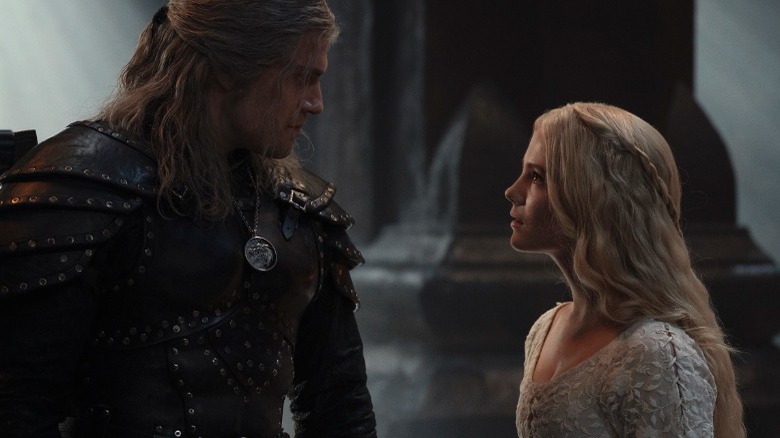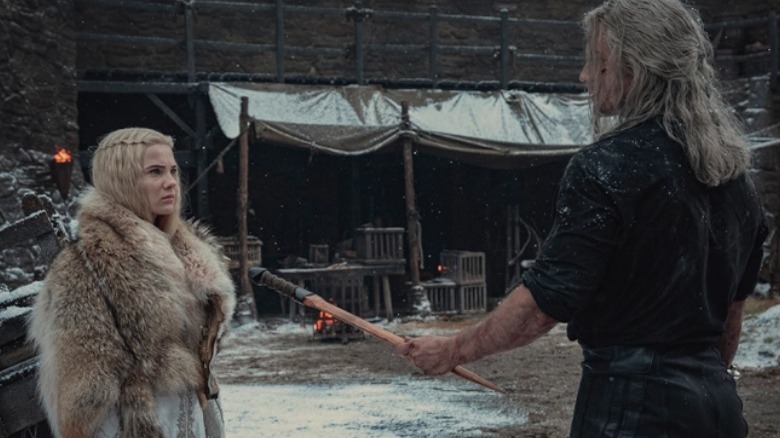Who Are The Rats In The Witcher? The Subject Of The Next Rumored Spinoff Explained
This post contains potential spoilers for "The Witcher" season 3.
Polish fantasy author Andrzej Sapkowski built a sweeping, layered world filled with monsters, witchers, and sorcerers in his acclaimed novel series, "The Witcher." Sapkowski's saga, told both in novel and short story form, shines brightest when exploring complex characters, who inform the principles of the world they inhabit, and vice versa.
Sapkowski's worldbuilding has, to an extent, been captured by Netflix's television adaptation of the novels, which has been renewed for a third and fourth season. Although the exact plot points of season 3 remain under wraps, it will most likely explore Ciri's Elder Blood status in greater detail, along with the political upheaval that grips the Continent. Several new characters will debut in the upcoming season, including Mistle (Christelle Elwin), "a member of The Rats, a gang of misfit teenagers who steal from the rich and give to themselves ... and sometimes the poor."
While it seems that Mistle will play a part in Ciri's trajectory in the third season of the main "Witcher" series, showrunners Lauren Schmidt Hissrich and Declan De Barra are rumored to be working on a spinoff focusing exclusively on the Rats. The duo are hard at work widening the ambit of Netflix's Witcherverse, with the recent release of the prequel miniseries, "The Witcher: Blood Origin," which thoroughly lacks the nuance, charm, or craftsmanship of the original series. While the future of the franchise seems grim, especially with Henry Cavill's abrupt exit after filming season 3, this rumored spinoff about the Rats could potentially reinvigorate the franchise.
Exploring the Continent
De Barra recently told Radio Times that the nature of Sapkowski's world allows showrunners the freedom to craft standalone stories, as the boundaries of his worldbuilding can be widened further:
"Sapkowski is the king of the closed-ended story, the more we read his books, the broader the tapestry of the world. So that's the advantage of doing all these — they might be standalone pieces, but they paint another side to this world and expand it outward. That's the fun part."
For instance, "Blood Origin" takes place 1,200 years before the events of the Netflix series, and recounts a wholly original tale about seven heroes who band together to defeat the Golden Empire. While Sapkowski says little about the world prior to the Conjunction of the Spheres, "Blood Origin" attempts to fill in the gaps and offer an explanation in terms of the cataclysmic event and the creation of the first Witcher. Next, the showrunners intend to add to the story of the Rats, who might be briefly featured in the parent series but will be allowed their own space to blossom, if a spinoff about the criminal gang does go ahead.
So, who exactly are the Rats, and why are they important to the central story? Appearing in Sapkowski's "Time of Contempt," the Rats are comprised of eccentric members including Asse, Iskra, Kayleigh, Mistle, and Reef, who steal from the rich in Geso and often revel in the chaos that accompanies these attacks. After Ciri survives the Korath desert, she is caught by a gang of slavers known as the Trappers, who also happened to nab Kayleigh. When Kaleigh is in danger, Ciri uses her wit and sword skills to help her. This impresses the Rats, who arrive soon after.
The Rats play a dark role in Ciri's arc
Those who've read "Time of Contempt" will be inclined to agree that the Rats are perhaps the least interesting group to explore, as the main narrative branches into several other routes that are more thrilling by a long shot. However, the saga of the Rats is central to Ciri's journey, as she ends up joining the criminal gang under the alias Falka. Every member of the Rats hails from a troubled background, eliciting varying amounts of sympathy — however, the group is drawn together for reasons beyond their love for vibrant colors, horses, and lavish feasts: every member of the Rats relishes violence in one way or another. And the worst part? Ciri begins to share this sentiment.
Granted, the Rats do possess some Robin Hood-esque qualities, as they do not maim and kill for goods, but for the thrill of the escapades. They sometimes hand over stolen wealth to the poor, which prompts the local folk to shield the group whenever the Nilfgaardians were out to hunt them. After Ciri/Falka joins them in their exploits, she gradually begins to enjoy the act of murder, fueling the anger and disappointment deep inside her. This is an especially dark period in Ciri's journey, and her actions while associated with the Rats are dangerously twisted and severely out of character.
As someone personally mentored by Geralt, trained by the witchers in Kaer Morhen, and partly raised by the honorable Clan An Craite, Ciri has little reason to side with bloodthirsty criminals, let alone indulge in their extremes. The Rats storyline of the books is the weakest in terms of thrill or character development and adds nothing concrete to Ciri's arc. At best, it is an unsavory diversion from her true path.
Do the Rats really warrant a spinoff?
The presence of Mistle in "The Witcher" season 3 definitely hints at the presence of the Rats, although it is unclear how the showrunners intend to retrofit this aspect of the story. Sapkowski does delve into considerable detail about every Rats member, but their backstories — although dynamic — are not nearly interesting enough when compared to the scale of events in "Time of Contempt." The only reason they're integral to the central narrative is Ciri's eventual involvement with the gang, which comes to an end after a rather long time when everyone except her is slaughtered by the formidable bounty hunter, Leo Bonhart.
When Ciri leaves before Bonhart's attack, her storyline finally picks up and assumes real significance — she is back on her path and reverts to being the child of prophecy we knew prior to her involvement with the Rats. Keeping these factors in mind, a spinoff featuring the Rats alone would add painfully little to Netflix's Witcherverse, especially when there is a vast sea of interesting lore to explore in a potential spinoff.
A simple, yet effective idea for a spinoff could potentially be along the lines of "The Nightmare of the Wolf," which explores Vesemir's rise to becoming a witcher. A similar trajectory can be explored in live-action, featuring Geralt's adventures of monster-slaying, which would allow us to meet beasts from Sapkowski's world. Mimicking the quest format of "The Witcher" video games, these mini-adventures would allow us a better glimpse of the world, its magical inhabitants, and the doomed monster-hunters who are both revered and despised.
Although I'm not sure what the future of "The Witcher" franchise holds, one can hope that it can weather the storm. Till then, wind's howling.



